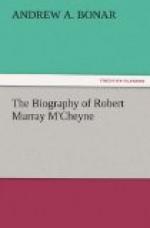To another friend in the ministry who had written to him despondingly about his people and the times, his reply was, “I am sure there never was a time when the Spirit of God was more present in Scotland, and it does not become you to murmur in your tents, but rather to give thanks. Remember, we may grieve the Spirit as truly by not joyfully acknowledging his wonders as by not praying for Him. There is the clearest evidence that God is saving souls in Kilsyth, Dundee, Perth, Collace, Blairgowrie, Strathbogie, Ross-shire, Breadalbane, Kelso, Jedburgh, Ancrum; and surely it becomes us to say, ’I thank my God upon every remembrance of you.’ Forgive my presumption; but I fear lest you hurt your own peace and usefulness in not praising God enough for the operation of his hands.” To another: “I have told you that you needed trial, and now it is come. May you be exercised thereby, and come to that happy ‘afterwards’ of which the apostle speaks,” To the same again “Remember the necessity of your own soul, and do not grow slack or lean in feeding others. ‘Mine own vineyard have I not kept.’ Ah, take heed of that!” And in a similar tone of faithfulness at an after period: “Remember the case of your own soul. ’What will it profit a man to gain the whole world and lose his own soul?’ Remember how often Paul appeals to his holy, just, unblameable life. Oh that we may be able always to do the same!” “Remember the priming-knife,” he says to another, “and do not let your vine run to wood.” And after a visit to Mr. Thornton of Milnathort, in whose parish there had been an awakening, he asks a brother, “Mr. Thornton is willing that others be blessed more than himself; do you think that you have that grace? I find that I am never so successful as when I can lie at Christ’s feet, willing to be used or not as seemeth good in his sight. Do you remember David? ’If the Lord say, I have no delight in thee; behold, here am I; let Him do to me as seemeth good unto Him.’”
In his familiar letters, as in his life, there was the manifestation of a bright, cheerful soul, without the least tendency to levity. When his medical attendant had, on one occasion, declined any remuneration, Mr. M’Cheyne peremptorily opposed his purpose; and to overcome his reluctance, returned the inclosure in a letter, in which he used his poetical gifts with most pleasant humor.
To many it was a subject of wonder that he found time to write letters that always breathed the name of Jesus, amid his innumerable engagements. But the truth was, his letters cost him no expenditure of time; they were ever the fresh thoughts and feelings of his soul at the moment he took up the pen; his habitual frame of soul is what appears in them all; the calm, holy, tenderly affectionate style of his letters reminds us of Samuel Rutherford, whose works he delighted to read,—excepting only that his joy never seems to have risen to ecstasies. The selection of his letters which I have made for




